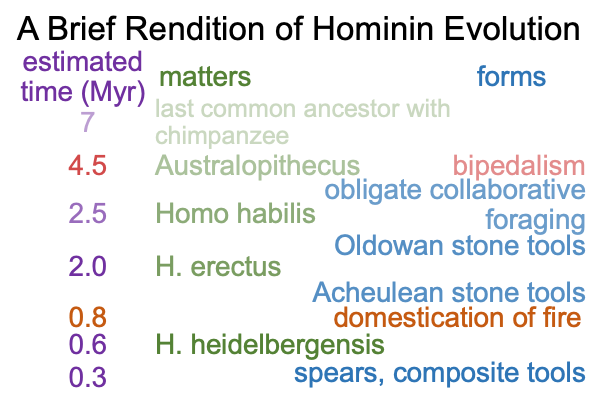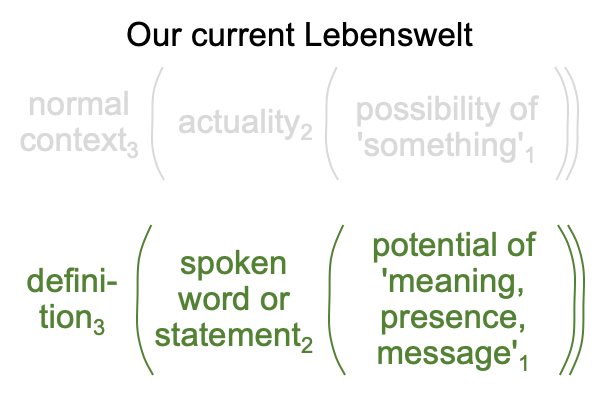0016 Chapter one introduces the idea that the author will present pieces of a jigsaw puzzle.
In chapter fifteen, the author assembles the pieces.
0017 Chapter two presents a brief rendition of human evolution.
Here is a list, with a few items that Mithen does not mention, stopping before the evolution of the Neanderthal and our own species, Homo sapiens.

0018 Here is one item that Mithen does not mention. Once bipedalism is an adaptation to mixed forest and savannah, Michael Tomasello’s concept of obligate collaborative foraging becomes relevant. See Razie Mah’s blog for January through March, 2024. Specialized cognitive modules may be adaptations to the mental and physiological demands of particularly successful teams. Over generations, hominins find it easier and easier to learn and perform team tasks. Plus, their brains increase in size with each successful team.
0019 Chapter three offers a disputation on words and language. A key technical term is “displacement”. “Displacement” acknowledges the reality that the referent is not present when a spoken word is used. I can say the word, “moon”, without the planetesimal being visible. But, where does the word, “displacement”, appear in this chapter on words and language? And, why does it appear in chapter six, concerning iconic and arbitrary words?
0020 Yes, what about the spoken word, “displacement”?
Is “displacement” located, as presence1 in the following category-based nested form?

The triadic normal context of definition3 brings the dyadic actuality of a spoken word or statement2 into relation with the monadic potential of ‘meaning, presence and message’1.
0021 Of course, in speech-alone talk, “displacement” refers to the reality that the referent is not present when a spoken word is used. But, is that reality2 the presence1 underlying the term “displacement”? If the answer is “yes”, then the message must be something like, “Hey, you better figure out whether the displaced referent has… um… the meaning that you think it has.”
0022 The other day, I “loaned” a friend twenty bucks.
Do I think that I’m getting that money back?
0023 That raises the question, “What is the presence1 that characterizes the word, ‘displacement’?”
On one hand, the referent is what is displaced.
On the other hand, what goes into that displacement?
0024 Mithen skirts around these ridiculous issues After all, displacement is so obvious that it appears in chapter six (On Iconic and Arbitrary Words) and not in chapter three (Words and Language).
